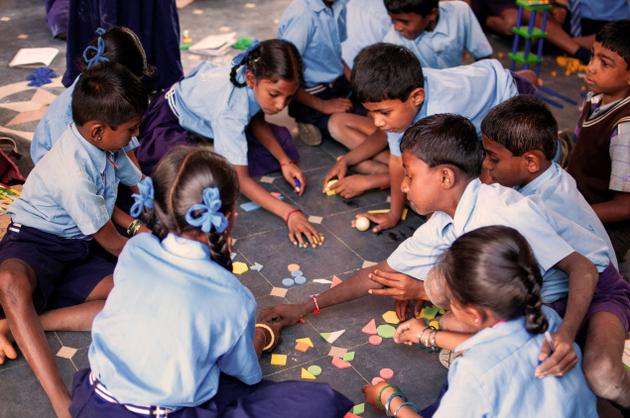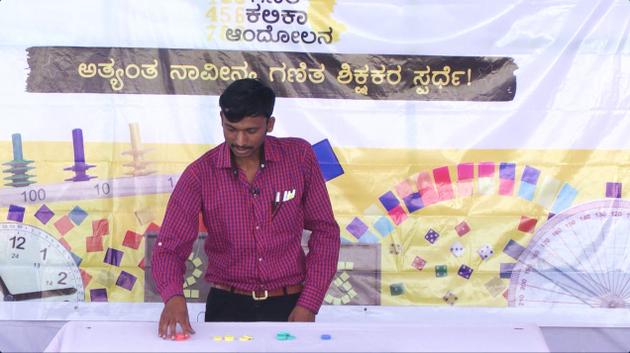
A clever television contest for Most Innovative Maths Teacher finds schools vying for honours, and viewers asking for reruns.
February 14. It was a special day for many students in the north Karnataka taluk of Kushtagi, Koppal district. They were all set to watch their teachers vie for the title of ‘Most Innovative Maths Teacher in Kushtagi’, at the first-ever mathematical reality TV show for teachers of government schools.

Of the six finalists, at the Ganitha Kalika Andolan contest, Iranna Patil of Government Higher Primary School, Thopalakatti, walked away with the title for his demonstration of the concept of data collection and analysis, and how it could be taught creatively to students of classes IV and V.
Teachers Hafisa Begum of Lower Primary School, Mankalkeri, and Geeta Basarakoda of Lower Primary School, Sherifnagar, took the second and third places, respectively. They were chosen for making maths an enjoyable learning experience.
Ganitha Kalika Andolan (GKA) was started by Akshara Foundation in partnership with the Karnataka government and Sarva Shiksha Abhiyan to improve numeracy skills and facilitate classroom teaching of mathematics in the six districts of the Hyderabad-Karnataka region. Since June 2015, the Bengaluru-based not-for-profit movement has trained over 7,500 teachers in mathematics teaching, especially using teaching learning material such as the Akshara Math Kit, which contained play money, dice, weighing scales, beads and geometric shapes.
But how effective was the programme? Were teachers enthused about it? In 2014-15, the organisation had included popular film dialogues and even a maths jingle composed by Grammy award-winner Ricky Tej to make teaching and learning fun. Would television also help? This led to the GKA contest. The Nanjundappa Committee report for the Redressal of Regional Imbalances states that Akshara Foundation chose Kushtagi, one of the 39 taluks in the report’s ‘most backward’ taluks list. The organisation had trained over 300 teachers in the taluk even before GKA. A peppy teaser was aired on television, and soon teachers started sending in their entries in the form of short videos.
Of the over 230 entries from the 220 schools in Kushtagi, 20 were shortlisted for an exciting buzzer round. During the finals on stage, excitement was high. The teachers had to use elements from the maths kit to demonstrate their lesson. “I knew the answer to one of the judge’s questions, but I fumbled while facing the camera,” says Savitha Maleda. A teacher at the GHPS in Ryavanaki, she always enjoyed using song and dance to teach, but since the maths contest was announced, she has been trying out other creative ways as well. She now wants to do a post-graduation so that she can teach high school students as well.
For Iranna Patil, the contest was a big fillip. “It spread awareness about creative methods of teaching. Earlier, the maths kits were not being used much. Now, all my teacher friends want to use them. We have a Whatsapp group of science teachers, who share news about teaching methods,” says this young man.
Kanchan Bannerjee, managing trustee at Akshara Foundation, says, “We hope the contestants can inspire the larger teaching community as also the students and their parents to see maths as a fun subject.”
As partners involved in releasing the Annual Status of Education Report (ASER), Akshara Foundation is convinced that mathematics needs a leg-up in our schools. Before approaching the Karnataka government with the idea of GKA, the organisation had run the module for nearly four years in schools in Hoskote. They made sure the comprehensive teaching methodology envisaged in the GKA programme was compliant with the guidelines prescribed by the National Curriculum Framework 2005 and that it supported the textbooks and workbooks designed by the Karnataka Department of State Educational Research and Training. They made their manuals and video modules for teachers available under Creative Commons, making it possible for people to freely use them.
“The GKA model runs for two years, and with just a few adaptations it can be replicated anywhere. We hope that our government will extend this to other districts too,” says Ashok Kamath, chairman of Akshara Foundation.
That the TV channel had several viewers asking for a re-telecast shows what a masterstroke it was to use television for maths.
Mala Kumar writes for children and edits books for Pratham Books. She was one of the judges at the GKA contest.
source: http://www.thehindu.com / The Hindu / Home> Features> Magazine / by Mala Kumar / March 05th, 2016








